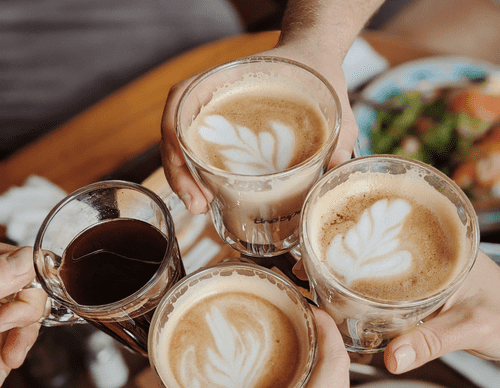The answer to Why Does Coffee Not Affect Me can be very tricky and may vary from person to person.
So why does coffee not affect me? Caffeine tolerance varies from person to person and can be affected by factors such as genetics, body weight, regular caffeine intake, and individual sensitivity.
Some people may not feel the effects of caffeine due to a tolerance built up from frequent consumption, while others may not be as sensitive to its effects. It’s important to monitor individual reactions to caffeine and speak with a healthcare provider if necessary.

Table of Contents
5 Reasons Why Does Coffee Not Affect Me
- Tolerance
- Genetics
- Body weight
- Other medications
- Food and drink intake

How Does Coffee Influence Our Body’s Workflow
5 Reasons Why Does Coffee Not Affect Me
Despite its reputation for providing a boost of energy, some people do not experience any changes after consuming coffee. In this article, I will explain five reasons why coffee may not affect some people.
Genetics
One of the main reasons why coffee does not affect some people is genetics. Our genetic makeup plays a significant role in how our body processes caffeine. Caffeine is metabolised by an enzyme called CYP1A2, and some people produce more of this enzyme than others. This allows them to metabolise caffeine quickly, reducing its effects. On the other hand, individuals who produce less of this enzyme will feel the effects of caffeine for a longer period.
Regular Consumption
Another reason why coffee may not affect some people is regular consumption. When individuals consume coffee regularly, their body builds up a tolerance to its effects. Over time, they will require more caffeine to feel its effects, and eventually, they may not feel the effects of caffeine at all.
Weight and Body Composition
Body weight and composition also play a role in how quickly the body processes caffeine. Individuals who are heavier and have a higher body fat percentage tend to metabolise caffeine more slowly. On the other hand, those who are lighter and have a lower body fat percentage will metabolise caffeine more quickly.
Medications
Certain medications can interact with caffeine and either enhance or reduce its effects. For example, some medications used to treat depression, anxiety, and headaches can increase the effects of caffeine. On the other hand, other medications, such as birth control pills, can reduce the effects of caffeine. If you are taking any medications, it is essential to consult with your healthcare provider to determine if there are any interactions with caffeine.
Individual Sensitivity
Finally, some individuals may simply be more sensitive to caffeine, while others may be less sensitive and require more to feel its effects. This sensitivity is often determined by a combination of factors, including genetics, weight, body composition, and overall health.
How long does coffee last in your system
The length of time that coffee remains in the system depends on various factors such as the amount consumed, individual tolerance, and metabolism. Generally, the effects of caffeine can be felt within 15 to 45 minutes of consumption and can last anywhere from 3 to 5 hours.
However, the half-life of caffeine, which is the amount of time it takes for half of the consumed caffeine to be metabolised, can vary greatly depending on individual factors. The average half-life of caffeine is around 5 hours, but it can range from 2 to 9 hours depending on the person. For example, those with a faster metabolism may metabolise caffeine more quickly, while those with a slower metabolism may take longer to metabolise it.
In addition, the presence of certain medications, such as birth control pills or antidepressants, can affect the half-life of caffeine and either increase or decrease the amount of time it remains in the system.
It’s important to note that the effects of caffeine can also linger beyond its half-life, as it can continue to affect the body’s natural rhythms and sleep patterns, leading to fatigue and insomnia.

What to do if caffeine doesn’t work
Caffeine is a commonly consumed stimulant that is often used to help increase alertness and energy levels. However, some people may find that caffeine doesn’t work for them, or they may experience negative side effects after consuming it. In such cases, it’s important to identify the underlying cause and consider alternative methods for improving energy levels and focus.
Assess caffeine tolerance
If you’ve been consuming large amounts of caffeine regularly, you may have built up a tolerance, meaning that it no longer has the same effects as it once did. In this case, reducing your caffeine intake or taking a break from it for a few weeks can help reset your tolerance.
Check for medical conditions
Certain medical conditions such as anxiety, depression, and sleep disorders can affect how caffeine affects you. If you suspect that a medical condition may be the cause of your negative reaction to caffeine, it’s important to speak with a healthcare provider for proper evaluation and treatment.
Consider alternative sources of energy
If caffeine doesn’t work for you, there are many other natural and healthy ways to increase your energy levels. For example, physical activity, proper nutrition, and hydration, adequate sleep, and stress management can all help boost energy levels.
Try alternative stimulants
If caffeine still doesn’t work for you, you may consider trying alternative stimulants such as green tea, which contains a milder form of caffeine, or herbal supplements such as ginseng or guarana, which can provide a natural energy boost.
Re-evaluate your lifestyle
Sometimes the cause of low energy levels and lack of focus may be related to your lifestyle. For example, poor diet, lack of physical activity, stress, and sleep deprivation can all have a negative impact on your energy levels. Making changes to your lifestyle, such as eating a healthy diet, getting regular exercise, reducing stress, and ensuring adequate sleep can help improve your energy levels.
Some Factors Affecting Your Caffeine Intake
Can you be immune to caffeine?
It is not possible to be completely immune to caffeine, but some people may have a higher tolerance for it and not feel its effects as strongly. Caffeine is a stimulant that works by blocking the action of adenosine, a neurotransmitter that causes feelings of fatigue and drowsiness. The effects of caffeine can vary greatly from person to person, and several factors can influence how it affects an individual.
Genetics play a role in determining a person’s tolerance to caffeine. The gene CYP1A2, which is responsible for the metabolic rate of caffeine, can vary from person to person, affecting their ability to metabolise the stimulant. People with a fast metabolism tend to metabolise caffeine faster, reducing its effects.
Regular consumption of caffeine can also lead to a tolerance, reducing its effects over time. As the body becomes accustomed to caffeine, it may require more of it to feel its effects.
Body weight, composition, and metabolism can also affect how quickly the body processes caffeine. Those who are heavier and have a faster metabolism tend to metabolise caffeine faster than those who are lighter and have a slower metabolism. Body composition also plays a role, with individuals who have a higher muscle mass compared to body fat metabolising caffeine faster.

How many cups of coffee is too much?
The amount of coffee that is considered “too much” can vary depending on a number of factors such as body weight, tolerance, and individual sensitivity to caffeine. Generally, most health experts consider a moderate caffeine intake to be around 400 milligrams per day, which is roughly equivalent to four cups of coffee.
However, it’s important to note that consuming more than this amount can lead to negative side effects such as increased heart rate, jitters, insomnia, and even headaches. For some individuals, even a moderate amount of caffeine may cause these symptoms, while others can consume larger amounts without any adverse effects.
It’s also important to keep in mind that caffeine is not only found in coffee, but also in energy drinks, tea, chocolate, and various other products. It’s essential to keep track of your total daily caffeine intake from all sources to avoid overconsumption.
Additionally, it’s crucial to consider the timing of caffeine consumption. Consuming caffeine late in the day can negatively affect sleep patterns, leading to insomnia and fatigue the next day.
Can you develop coffee intolerance?
Yes, it is possible to develop a coffee intolerance. A coffee intolerance, also known as caffeine intolerance, is a condition where an individual experiences negative symptoms after consuming caffeine. These symptoms can range from mild to severe and can include heart palpitations, anxiety, jitters, headaches, and digestive issues such as nausea and acid reflux.
The development of a coffee intolerance can be due to a variety of factors, including genetics, chronic overconsumption of caffeine, and individual tolerance levels. Some individuals may be more sensitive to caffeine and may experience negative symptoms after consuming even small amounts, while others may be able to consume larger amounts without any adverse effects.
It’s important to note that a coffee intolerance should not be confused with an allergy to coffee, as an allergy is a different type of immune response that can cause more severe symptoms such as hives, itching, and difficulty breathing.
Is energy drink better than coffee
When it comes to choosing between an energy drink and coffee, the answer is not a straightforward one as it depends on individual preferences and needs. Both energy drinks and coffee contain caffeine, which is a stimulant that can provide a boost of energy and improve alertness. However, there are some key differences between the two that are worth considering.
Coffee typically contains less caffeine than energy drinks, but it also contains other natural compounds such as antioxidants and polyphenols that can provide health benefits. On the other hand, energy drinks often contain large amounts of caffeine, as well as additional ingredients such as taurine, guarana, and B-vitamins that are marketed to enhance energy and physical performance. However, these added ingredients can also have negative side effects, such as high blood pressure, heart palpitations, and dehydration, especially if consumed in large amounts.
In terms of taste, coffee is a preferred choice for many people due to its rich and flavourful taste, whereas energy drinks can have a more artificial or medicinal taste. Additionally, coffee is often consumed for its taste as well as for its energy-boosting effects, whereas energy drinks are often consumed purely for their energy-boosting effects.
It’s also worth considering the cost and convenience of each option. Coffee is often more affordable and readily available, while energy drinks can be more expensive and less accessible.


